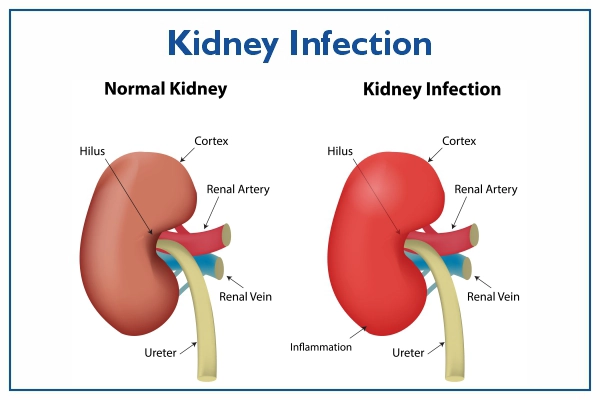Kidney infections, also known as pyelonephritis, can be a serious and potentially life-threatening condition if left untreated. Recognizing the symptoms of a kidney infection is crucial for prompt diagnosis and treatment. In this comprehensive guide, we’ll explore the signs and symptoms of kidney infections, including those specific to women and pregnancy, to help you stay informed and take action if needed.
Understanding Kidney Infection Symptoms:
Kidney infections occur when bacteria infect the kidneys, leading to inflammation and potentially severe complications if not treated promptly. Common symptoms of kidney infections include:

Fever and chills:
A high fever, often accompanied by chills and shaking, is a hallmark symptom of a kidney infection. The body’s immune response to the infection can cause a sudden rise in body temperature, leading to fever and discomfort.
Flank Pain:
Pain in the back or side, known as flank pain, is another common kidney infection symptom. The pain may be dull and achy or sharp and severe, and kidney infection symptoms typically occur on one side of the body, where the affected kidney is located.
Abdominal Pain:
In addition to flank pain, kidney infections can cause abdominal pain or discomfort. The pain may be localized to the area around the kidneys or may radiate to other parts of the abdomen.
Frequent Urination:
People with kidney infections often experience an increased need to urinate, as well as a sense of urgency. The urge to urinate may occur frequently, yet each time it may only pass small volumes of urine.
Painful Urination:
Pain or a burning sensation during urination, known as dysuria, is a common symptom of urinary tract infections (UTIs), which can progress to kidney infections if left untreated. Kidney infection symptoms are accompanied by blood in the urine, known as hematuria.
Cloudy or Foul-Smelling Urine:
Changes in urine colour or odour, such as cloudy or foul-smelling urine, may indicate the presence of an infection in the urinary tract, including the kidneys.
Nausea and vomiting:
Kidney infections can cause nausea and vomiting, particularly if the infection is severe or accompanied by other symptoms such as fever and abdominal pain.
Kidney infection symptoms in women:
Women may experience additional kidney infection symptoms, including:
Pelvic Pain:
Women with kidney infections may experience pelvic pain in addition to flank and abdominal pain. This pain may be dull or sharp and may worsen with movement or pressure.
Painful Intercourse:
Kidney infections can cause discomfort or pain during sexual intercourse, known as dyspareunia. This symptom may be accompanied by other symptoms, such as urinary urgency and frequency.
Vaginal Discharge:
Some women with kidney infections may experience abnormal vaginal discharge, which may be thick, white, or yellowish in colour and may have a foul odour.
Kidney Infection Symptoms in Pregnancy:
Pregnant women may experience unique kidney infection symptoms,including:
Fever and chills:
Pregnant women with kidney infections may experience fever and chills, similar to non-pregnant individuals. However, fever during pregnancy can pose risks to both the mother and the developing fetus and should be promptly evaluated by a healthcare provider.
Lower Back Pain:
Lower back pain is a common kidney infection symptom in pregnancy, as the kidneys are located in the lower back region. This pain may be persistent or intermittent and may worsen with movement or activity.
Fatigue:
Pregnancy can be physically demanding, and fatigue is a common kidney infection symptom experienced by many pregnant women. However, persistent fatigue, especially when accompanied by other symptoms such as fever and urinary changes, may indicate a kidney infection and should be evaluated by a healthcare provider.
Conclusion:
Recognizing the kidney infection symptoms is essential for prompt diagnosis and treatment. If you experience any of the symptoms mentioned above, particularly if they are severe or persistent, it’s important to seek medical attention promptly. Kidney infections can lead to serious complications if left untreated, but with early intervention, most cases can be successfully treated with antibiotics and supportive care. By staying informed and aware of the signs and symptoms of kidney infections, you can take proactive steps to protect your health and well-being.

